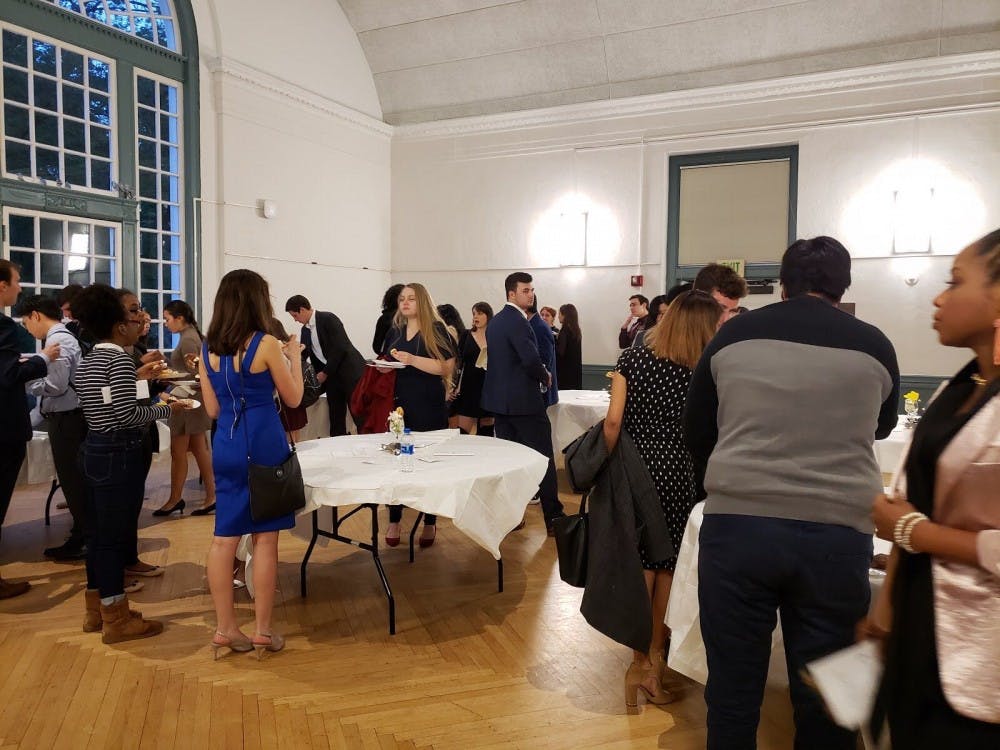The Johns Hopkins Undergraduate Law Review hosted the first Law Review Gala this Monday. The event featured William H. “Billy” Murphy Jr., a civil rights lawyer and former judge who represented the family of Freddie Gray, and Christina Bostick, the civil rights lawyer who represented the family of Henrietta Lacks.
The Gala was open to all Hopkins undergraduates, although it was aimed at the pre-law community.
Junior Kiana Boroumand, editor-in-chief and founder of the Law Review, explained that they had selected speakers with roots in the Baltimore community.
Sophomore Hannah Stone, the director of programming for the Law Review, added that both speakers explored the intersection of law and science.
“I thought that they could provide an interesting perspective ... for some people who were more interested in STEM to get a perspective into law and potential ways they could apply it,” she said.
Murphy and Bostick spoke about the factors that drove them to pursue legal careers. Murphy grew up during the Civil Rights movement within an actively political family.
“That’s the household I grew up in. How could I turn out any other way than I did? Politics every day, every night. On the polls, all the time. That’s why I represented the Freddie Gray family,” he said.
Bostick grew up in a family of scholars, and her pursuit of law originated from her passion for providing a platform for the underrepresented. She described some of the challenges she faced in her education.
“I was not denied entry into the room but was forced to legitimize my presence there as my colleagues assumed that my accolades were more the result of affirmative action than derived from hard work,” Bostick said.
When asked about the difficulties of the court system and the pursuit of justice inside of the legal profession, Murphy talked about leaders getting involved outside the legal system.
“Lawyers also should be involved as candidates for elected office. Lawyers need to be involved in public interest organizations,” Murphy said. “There are so many things lawyers can do outside of a courtroom ... You can lobby within the profession.”
Bostick advocated for increasing the representation of women and minorities within the field.
Students felt that the event was a good start into increasing the presence of the pre-law community at Hopkins. Senior AJ Tsang said that this would be possible with the leadership of the student organizers.
“I’d love to see more events like these,” he said. “I think it’s amazing that [Boroumand], Anthony [Boutros] and so many others have brought together so many passionate individuals to create what is, in many ways, the first true pre-law student organization on campus.”
Senior Ryan Najmi said that there was a much larger pre-medical presence on Hopkins campus and that events like the Gala could encourage more students to consider law sooner in their Hopkins careers.
“I think there’s this tendency for people who come to Hopkins to be pre-med ... I think having more events like this and exposing more people to this alternative would allow more people like me who feel the passion to want to be a lawyer at some point to get on that bandwagon way sooner,” he said.
He noted that his interest in the legal field came from his work in startups, and that the event inspired him to pursue that interest.
Several students noted that resources and community presence for pre-law were more limited compared to pre-medical advising at Hopkins. Sophomore Lyle Carrera, who is pre-law, felt that the resources were not as extensive.
“To my knowledge, pre-law involves being on an email list and having an advisor,” he said.
Junior Robert Cortes also remarked that there were not as many organizations devoted to the pre-law community at Hopkins. He said that the Law Review was the first organization dedicated to students interested in becoming lawyers.
For student organizers, the Gala was the culmination of a year’s worth of work. The Law Review began last fall with the organizers attempting to provide a place for undergraduates to write, think and talk about issues related to the legal system.
Boroumand explained that the Law Review’s successes could facilitate further growth of the pre-law community at Hopkins.
“This has been our first full year of operation,” she said. “We’re really looking to build our momentum going into next year, to recruit more people to join our staff and to hopefully have more events like this where we can have these kinds of conversations.”
Clarification: The original version of this article stated that Kiana Boroumand and Hannah Stone are members of the JHULR. Boroumand is the editor-in-chief and founder of the Law Review, while Stone is the director of programming for the Law Review.





